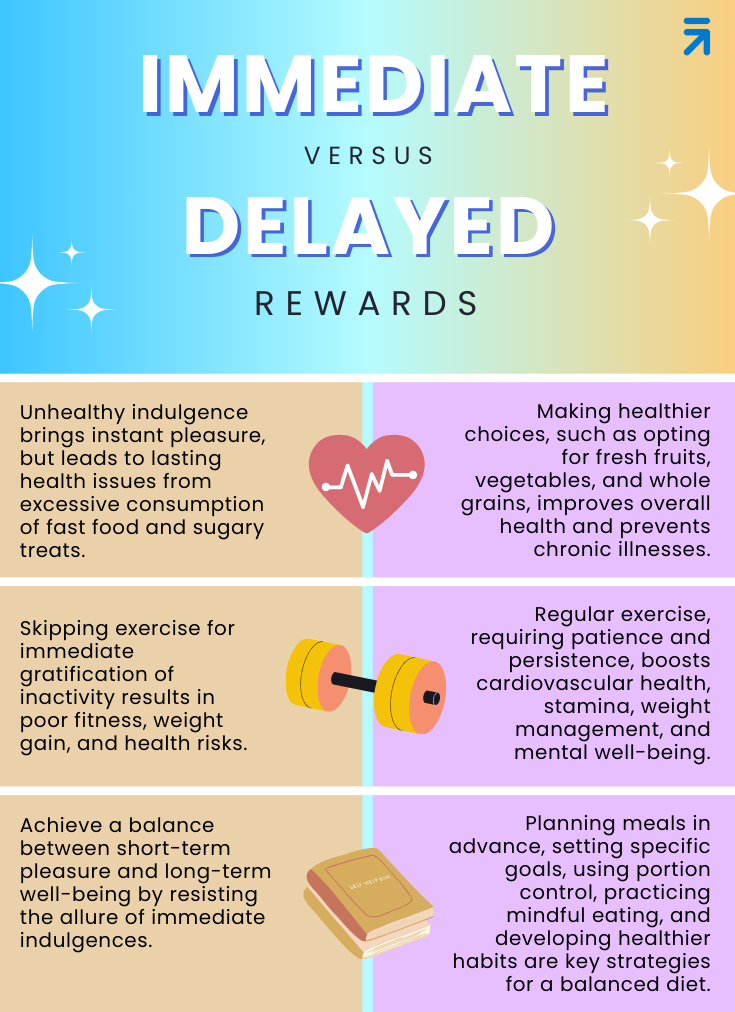The Wellness of Waiting: How Delayed Gratification Can Lead to Healthier Choices

Stay tuned to our latest news
“Embrace Your Pace” is more than just a phrase; it is a philosophy for individuals who march to the beat of their own drum. As the seasons transition from the fresh blossoms of April to the sunlit days of June, this ongoing RENPHO series will help to highlight the myriad ways one can embrace a life lived at their own pace.
In a world where instant satisfaction is the norm, the ability to wait patiently has become a rare skill. Yet, research suggests that mastering this art can significantly impact our overall well-being. Delayed gratification refers to the ability to resist immediate rewards or pleasures in order to achieve long-term goals or benefits. It involves exercising self-control and resisting the temptation to indulge in immediate pleasures, such as unhealthy foods or impulsive purchases.
In the context of health and wellness, delayed gratification plays a crucial role in promoting overall well-being. By practicing self-control around food, individuals can make healthier choices and maintain a balanced diet. This can lead to a lower risk of chronic illnesses, such as obesity, heart disease, and diabetes.
Furthermore, delayed gratification strengthens self-control, which is an essential skill in various aspects of life. It helps individuals resist impulsive behaviors and make better decisions, not only related to health but also in personal and professional domains. By learning to delay gratification, individuals can prioritize their long-term goals and take steps towards achieving them, leading to success and personal fulfillment.
The Science of Self-Control

The concept of self-control, also known as willpower or self-regulation, plays a crucial role in our daily lives. It refers to our ability to resist impulsive behaviors and make choices that align with our long-term goals. Researchers have conducted numerous studies to explore the psychological and neurological aspects of self-control.
One important factor in self-control is delayed gratification, which involves resisting immediate rewards in favor of larger, long-term benefits. Studies have shown that individuals who can delay gratification tend to have better life outcomes, such as higher academic achievements, healthier relationships, and greater financial stability. This is because delaying gratification requires self-discipline and the willingness to prioritize long-term goals over immediate desires.
The prefrontal cortex, a region of the brain responsible for decision-making and impulse control, plays a crucial role in self-control. Research has shown that this brain region is less active in individuals with weaker self-control, suggesting a link between neural activity and self-regulation. Strengthening self-control can lead to a more active prefrontal cortex, allowing individuals to make better decisions and resist impulsive behaviors.
Various techniques can help strengthen self-control and promote delayed gratification. These include setting specific goals, creating a plan to achieve them, practicing mindfulness and self-awareness, and developing strategies to overcome temptations. By utilizing these techniques, individuals can enhance their self-control and make choices that align with their long-term goals.
Immediate vs. Delayed RewardsImmediate rewards refer to the instant satisfaction or gratification that we receive for our actions or choices. On the other hand, delayed rewards imply waiting patiently for a better outcome in the future. In terms of health, the effects of immediate rewards and delayed rewards are considerably contrasting.  |
The Benefits of Waiting

One of the key benefits of delayed gratification is its positive impact on long-term health. Choosing to delay immediate gratification, particularly when it comes to food choices, has been shown to promote better self-control and healthier eating habits.
Several studies have linked delayed gratification with improved health outcomes. For example, research found that individuals who exhibited higher levels of self-control around food were more likely to have a lower body mass index (BMI) and healthier eating behaviors. This suggests that resisting the urge to indulge in immediate food pleasures can lead to a healthier weight and overall improved well-being.
Moreover, delaying gratification strengthens self-control, which can extend beyond just food choices. Building self-control skills enables individuals to make conscious decisions about various aspects of their lives, such as finances or relationships. This can have a profound impact on overall lifestyle choices, leading to healthier behaviors and reduced risk of chronic diseases.
To strengthen self-control and practice delayed gratification, individuals can utilize various techniques. These include setting specific goals, creating an environment that minimizes temptations, practicing mindfulness and stress management, and seeking social support.
Challenges and Considerations

Practicing delayed gratification can be challenging due to various reasons. One of the key challenges individuals might face is the difficulty of resisting immediate desires and temptations. This is particularly true when it comes to self-control around food, where the instant pleasure of indulging in unhealthy treats can override the long-term benefits of delayed gratification.
Another challenge is the societal pressure and influence that constantly encourages instant gratification. From fast-food advertisements to social media posts promoting instant satisfaction, the constant exposure to messages promoting immediate enjoyment can make it harder for individuals to strengthen their self-control and resist temptations.
To overcome these challenges, it is essential to develop strategies that can help strengthen self-control and reinforce delayed gratification. One effective technique is setting clear goals and establishing a plan of action to achieve them. This involves defining specific objectives and creating a step-by-step process to reach them, which can help individuals stay focused on the long-term benefits of delayed gratification.
Additionally, building a support system can provide the necessary encouragement and accountability. Surrounding oneself with like-minded individuals who value delayed gratification can foster a positive environment and make it easier to overcome challenges. Seeking help from a mentor or a professional who specializes in self-control can also be beneficial in gaining valuable insights and guidance.
By cultivating awareness of one's thoughts, emotions, and triggers, individuals can identify potential obstacles to delayed gratification and develop strategies to overcome them.
Integrating Delayed Gratification into Daily Life

Integrating delayed gratification into daily life is a powerful way to strengthen self-control and reap the benefits it offers. Here are some actionable steps to get started:
1. Set Clear Goals: Identify what you want to achieve in the short and long term. Understand that achieving these goals may require delaying instant gratification.
2. Prioritize Important Tasks: Learn to prioritize tasks that align with your goals over activities that offer immediate satisfaction. This may involve saying no to distractions or postponing less important activities.
3. Practice Mindfulness: Before succumbing to impulsive behaviors, take a moment to pause and consider the repercussions of instant gratification. Mindfulness helps strengthen self-control by allowing you to make more conscious decisions.
4. Develop Consistency: Make delayed gratification a habit by consistently implementing it in your daily life. Start small, perhaps by delaying a small treat or engaging in a productive activity before indulging in leisure activities.
5. Use Visualization Techniques: Imagine the long-term benefits and satisfaction that delayed gratification can provide. Visualize how your self-control around food or other temptations will contribute to your overall well-being.
By embracing these steps, you can gradually build self-control and integrate delayed gratification into your daily life. Remember, every small step counts, and with time, you will cultivate self-control that will benefit various aspects of your life.
Renpho Health Tips
-

An Introvert's Manifesto for Thriving at Your Own Rhythm
April 11, 2024
Read more >
-

How Updating Your Vision Board Can Help You Achieve Success
January 22, 2024
Read more >
-

Satisfying Every Palate: How to Cater to Specialized Dietary Requirements
April 4, 2024
Read more >
-

Is Managing Work and Life Stress a Balancing Act?
April 2, 2024
Read more >
-

The Power of Pause: Why Your Busy Life Needs Intentional Breaks
April 4, 2024
Read more >





